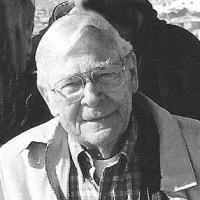People often bemoan the loss of civility in our society. Webster’s dictionary defines civility as “civilized conduct, especially courtesy and politeness.” We see the decline of civility in everyday encounters, from parking lots to movie lines, but it is especially notable in politics. That’s because civility is vital to a democratic system requiring constant compromise between differing opinions.
To me, the word civility has a simple definition: Bill Cleary. He was the personification of the concept, and his passing this week ended an era. At 92, Bill had outlasted most of his closest friends and colleagues, so his passing was little noted beyond his adopted home town of Grand Junction. He would have been OK with that; he was also the definition of humility. But it is unfortunate, because his life and legacy was national in scope, historic in importance, and essential to the West.
 William H. Cleary came to town as a broadcaster in the late 1950s, a great era for Western Colorado radio and television, when personalities like Bob Collins, Jim Eicher, Gene Rozelle, and Bill Cleary were local stars. Broadcast pioneer Rex Howell hired Bill at KREX TV, and there his life in politics began. He interviewed John F. Kennedy, who was in town campaigning in 1959, and met Congressman Wayne Aspinall (D-CO), chairman of the powerful House Interior Committee and the most influential Westerner in Congress.
William H. Cleary came to town as a broadcaster in the late 1950s, a great era for Western Colorado radio and television, when personalities like Bob Collins, Jim Eicher, Gene Rozelle, and Bill Cleary were local stars. Broadcast pioneer Rex Howell hired Bill at KREX TV, and there his life in politics began. He interviewed John F. Kennedy, who was in town campaigning in 1959, and met Congressman Wayne Aspinall (D-CO), chairman of the powerful House Interior Committee and the most influential Westerner in Congress.
Like everyone, Aspinall was impressed with Bill Cleary’s understanding of the issues, and his likeable manner, and offered him a job. Bill took him up on it and served over 20 years, outlasting not only Aspinall, but also his next two successors. When Aspinall left Congress in 1973, his successor, Republican Jim Johnson, kept Bill on. Johnson often reported that several insiders in DC had told him simply that “Bill Cleary goes with the district.” Johnson’s successor, Hank Brown, did the same. He served them all as what we now call Chief of Staff, though he never used that title – he never cared about titles.
Bill was involved in virtually everything related to conservation, water, public lands, forestry, energy, and the environment. He was also an expert on transportation and economic development. His fingerprints were on the most important legislation of the era, yet he and his beloved Pat also found time to raise a great family of seven sons.
Western Colorado was never far from his heart, though, and when former Governor “Johnny Van” Vanderhoof retired from the presidency of Club 20, the Board was quick to hire Bill Cleary, their only logical choice because nobody knew the territory like Bill. He served as Club 20’s “Voice of the Western Slope” for 6 years, holding everything together during the region’s devastating oil shale bust.
He used to tell with amusement how his first week on the job, two of the group’s largest funders went bankrupt, cancelling their membership. Friends assured Bill that members come and go, and “everything will be fine,” not yet grasping the full import (nearly 2/3 of the entire budget was gone within a year). Yet with his generosity of spirit and easy-going humor, he kept it all together. Bill once said of the late Grand Junction Chamber President Dale Hollingsworth, one of his closest friends, that “Ninety-nine percent of the time, he had a twinkle in his eye.” Funny, we often said the same thing about did Bill.
Bill Cleary was a lifelong Democrat, not just in name, but an activist, partisan, campaigning Democrat. Yet that didn’t preclude him working for two Republican congressmen, nor running a fairly conservative Club 20, nor remaining close friends with people across the spectrum (he publicly endorsed me when I ran for Congress as a Republican in 2004). He always cared far more about right and wrong than about party politics. He was an American first.
When I followed Bill as Club 20 President, he gave me a bit of very sound advice about dealing with other, adversarial, organizations: ignore them. “They have their agenda, we have ours; if they are looking for a fight, they should look elsewhere,” he said. Club 20 still had office space for Bill and Johnny Van, who still came in daily throughout my decade there. Bill became one of the great mentors of my life, and the lives of so many others. I learned from the master in so many ways, not just about important issues, but about the way local politics works, the human relationships involved, and how to get things done.
Bill Cleary was living proof that a good leader can have very strong views and unwavering principles, but also charm and good humor. He was the very definition of civility.
A version of this column originally appeared in the Grand Junction Daily Sentinel December 22, 2017.




Comments on this entry are closed.